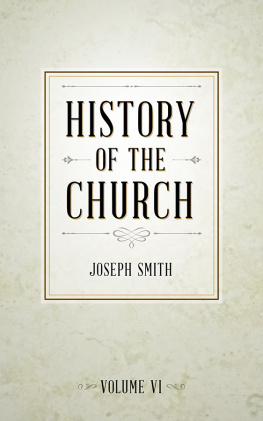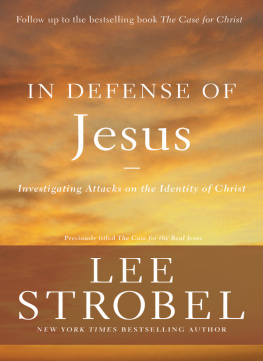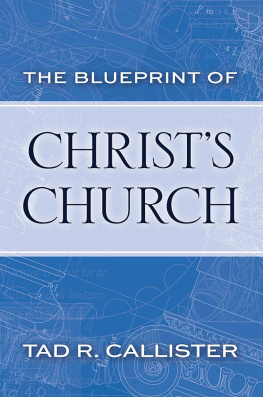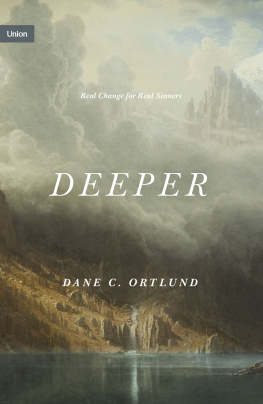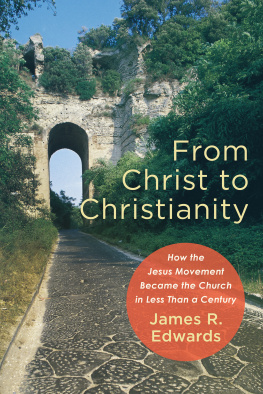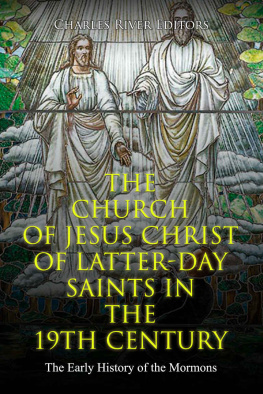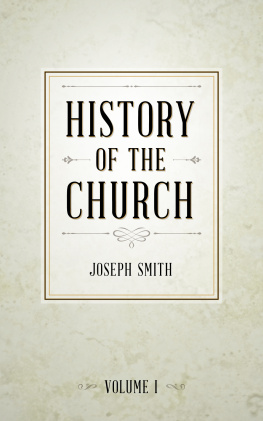United Church of God Editors - Jesus Christ: The Real Story
Here you can read online United Church of God Editors - Jesus Christ: The Real Story full text of the book (entire story) in english for free. Download pdf and epub, get meaning, cover and reviews about this ebook. year: 2008, publisher: United Church of God, genre: Religion. Description of the work, (preface) as well as reviews are available. Best literature library LitArk.com created for fans of good reading and offers a wide selection of genres:
Romance novel
Science fiction
Adventure
Detective
Science
History
Home and family
Prose
Art
Politics
Computer
Non-fiction
Religion
Business
Children
Humor
Choose a favorite category and find really read worthwhile books. Enjoy immersion in the world of imagination, feel the emotions of the characters or learn something new for yourself, make an fascinating discovery.
- Book:Jesus Christ: The Real Story
- Author:
- Publisher:United Church of God
- Genre:
- Year:2008
- Rating:3 / 5
- Favourites:Add to favourites
- Your mark:
- 60
- 1
- 2
- 3
- 4
- 5
Jesus Christ: The Real Story: summary, description and annotation
We offer to read an annotation, description, summary or preface (depends on what the author of the book "Jesus Christ: The Real Story" wrote himself). If you haven't found the necessary information about the book — write in the comments, we will try to find it.
Jesus Christ: The Real Story — read online for free the complete book (whole text) full work
Below is the text of the book, divided by pages. System saving the place of the last page read, allows you to conveniently read the book "Jesus Christ: The Real Story" online for free, without having to search again every time where you left off. Put a bookmark, and you can go to the page where you finished reading at any time.
Font size:
Interval:
Bookmark:
By United Church of God
Published by the United Church of God atSmashwords
Copyright 2001, 2008 United Church of God,an International Association
.
New King James Version (Copyright 1988 ThomasNelson, Inc, publishers) unless otherwise noted.
This publication is not to be sold. It is afree educational service in the public interest, published by theUnited Church of God, an International Association
####
Table of Contents
Who was Jesus? Few will dispute that a mannamed Jesus lived 2,000 years ago and that He was a great teacherwho impacted the world from His time forward.
He made a claim that was breathtaking in itsaudacitythat He was the very Son of God. For much of His lifetimeHe commanded only a small following, people who believed that claimand considered Him their promised Deliverer and King. Many otherslater came to believe that He was the Son of God as a result of thetestimony of those followers.
Yet during His time the religious authoritiesrejected Him as the Son of God. Many of His statements were socontrary to their teachings and traditions that they opposed Himand eventually succeeded in having Him put to death.
Likewise, the local Roman authorities alsosaw Him as a threat and became complicit in His execution, beingthe ones who actually carried it out. The religions of His dayopposed the growth of His teachings and used unlawful and violentmeans to try to destroy the Church He founded. The government ofRome also came to vigorously persecute the followers of this Jewishteacher from Galilee.
Controversy about Jesus continues
Today Jesus remains a controversial figure.The record of Jesus' life as recorded in the Gospel accounts hascome into question in many ways. For example, the Gospel writerspresented the miracles of Jesus as supernatural. Today, however,many rationalize them away as a normal function of naturemisunderstood at the time, or they simply dismiss them altogetheras fables.
Yet another and more modern reconstruction ofthe true Jesus appears in books and movies about His life. Forexample, most people have come to accept a popular likeness ofJesus far different from the way He really looked 2,000 years ago.These portrayals give an inaccurate picture of Christ's humanity.Such movies as The Last Temptation of Christ and the stageplay Jesus Christ Superstar, along with countless televisionproductions, have left a lasting impression on our minds and in theprocess distorted, as we will see, the true historical Jesus.
Of course, one can easily point to variationsin the beliefs and practices of those who've claimed to be Jesus'followers down through the centuries and rightfully ask thequestions, "Who is the real Jesus, anyway? And why should I want tofollow Him?"
Certainly if you take His statements asrecorded by His first-century disciples literally, and then youconsider all that has happened since, you may well perceive thatmost of those who have professed to follow Jesus over the centuriesactually haven'tand the same is true today.
Yet you might conclude that this is only tobe expectedthat Jesus taught nice but impractical ideas, thingsthat can't really work in the real world. Then again, perhaps theold saying, "the trouble with Christianity is that it has neverbeen tried," has a lot of truth to it. As Mahatma Gandhi once said,"Jesus I like, but I don't know about His followers."
Discovering the real Jesus
What is the real story? Can the true pictureof Jesus emerge after 2,000 years of differing views? Who should webelieve as we try to find it?
To know the real Jesus would include the factthat what He really taught, and what He really did, is essentialfor eternal life. Praying to His Father, Jesus said, "Thisis eternal life: to know you the only true God, and JesusChrist whom you have sent" (John 17:3, Revised English Bible,emphasis added throughout).
Did Jesus do what the records show? Was HeisHereally who He claimed to be? Can it be proved historically? Orare we left to simply accept it on blind faith?
And then perhaps the most important question:Does it really matter?
Let's put it this way: If the story of Jesusis a myth, if the reported events of His life along with His claimsand teachings are the fabrication of a small group of conspirators,then it certainly doesn't matter. We are then left to devisethe meaning of human life from our own imaginations.
But if Jesus Christ is who He says He wastheSon of God who came to earth to live as a human being, who died atthe hands of fellow human beings and who was raised from the deadthree days and three nights laterthen that changeseverything.
For this one single eventGod living anddying as a manthen becomes the most amazing event in the entirehistory of humanity.
It puts all of us in a situation thatrequires our full attentionbecause it leaves us ultimatelyaccountable for how we choose to respond.
Can we know? This booklet seeks to addressand answer the major questions that intelligent, reasoning peoplenaturally ask in trying to understand Jesus Christthe realstory.
The Roman governor of Judea, Pontius Pilate,faced a difficult situation when Jesus was brought before him.Apprehensively, he attempted to dismiss the picture that wasemerging in front of him. When Pilate heard the accusation, itstruck fear into his heart. "He has claimed to be the Son ofGod" (John 19:7, NRSV).
Pilate's next question betrayed his fear thathe was not dealing with an ordinary man. He had just been given amessage from his wife, who received a warning in a dream not tohave anything to do with this innocent man (Matthew 27:19). Pilatehimself knew that Jesus had been delivered to him because the chiefpriests were jealous of and despised Him (verse 18). Yet Pilatecouldn't avoid his date with destiny.
He next asked Jesus, "Where are You from?"(John 19:9). Pilate already knew He was Galilean. But whatgeographical area this Jewish teacher came from was not thequestion. Where are you really from is what Pilate wanted toknow. Jesus was silent. His claim to be the Son of God had alreadyanswered this question. But Pilate did not have the courage to dealwith this answer.
Accepting the real answer would have made allthe difference. The apostle Paul said that none of the rulers ofthis world knew who Jesus was, where He came from and His purposefor coming, "for had they known, they would not have crucified theLord of glory" (1 Corinthians 2:8).
Pilate could not face this issue. He knewwhat was right in this instance, but he feared losing power. Hefeared Caesar's reaction if it were reported that he did not dealwith someone who posed a threat to Roman control in the region(John 19:12). He feared a popular uprising if he did not agree tothe Jewish leaders' political demands. He also feared Jesus,because he was not quite sure with whom he was dealing.
Avoiding a difficult choice
In the end political expediency won out. Thestage was set to both indict all mankind of guilt and makeprovision for their forgiveness. Pilate gave the order for Jesus tobe crucified. The reality was denied, left for all to confront at alater time.
Most of us tend to ignore unpleasantrealities and make choices that we think are beneficial to us.Confronted with evidence as to who Jesus really was, would you facea reality that is too difficult for you to accept? Deep down, maybewe intuitively realize it would change life as we know it. Soperhaps it's better, we reason, not to look into this matter toodeeply to leave ourselves an out. That's the route Pilate took.
But this is where we have to begin. Who,really, was Jesus of Nazareth? Where did He really come from? If weunderstand that, it explains everything He did and said.
Font size:
Interval:
Bookmark:
Similar books «Jesus Christ: The Real Story»
Look at similar books to Jesus Christ: The Real Story. We have selected literature similar in name and meaning in the hope of providing readers with more options to find new, interesting, not yet read works.
Discussion, reviews of the book Jesus Christ: The Real Story and just readers' own opinions. Leave your comments, write what you think about the work, its meaning or the main characters. Specify what exactly you liked and what you didn't like, and why you think so.


